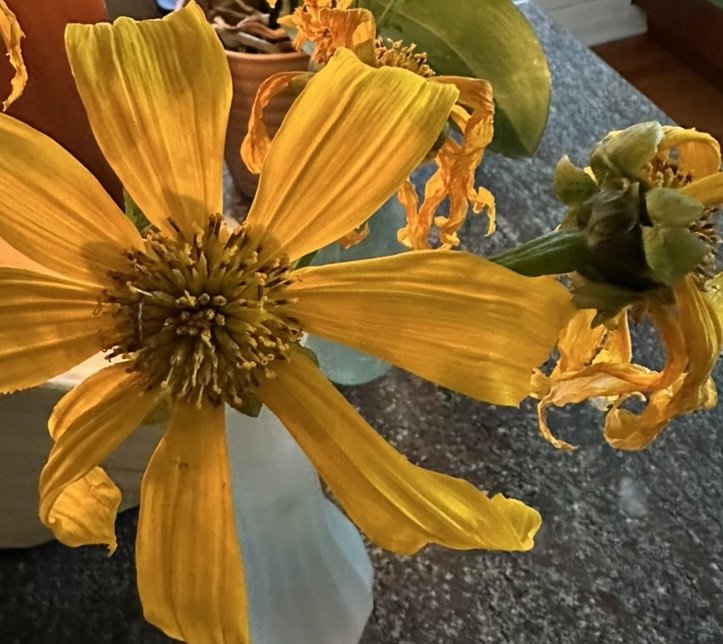Reality has dropped its petals
“Reality has grown old and gone senile; after all, it is definitely subject to the same laws as every living organism—it ages. Just like the cells of the body, its tiniest components—the senses, succumb to apoptosis. Apoptosis is a natural death, brought about by the tiredness and exhaustion of matter. In Greek this word means ‘the dropping of petals’. The world has dropped its petals.”
From Drive Your Plow Over the Bones of the Dead by Olga Tokarczuk, cited in Jennifer Higgie’s The Other Side: A story of Women in Art and the Spirit World
I read Tokarczuk’s Drive Your Plow Over the Bones of the Dead after reading her quote in Higgie’s The Other Side. Both books are evocative—well worth reading.
As I played with Tokarczuk’s metaphor I began thinking, well, why not? Reality is a living thing, and it must surely have cycles. Isn’t this what myths teach us? They are filled with examples of cultures’ deaths and rebirths. So, too, the seasons, our planet’s primary teachers for those of us living in temperate climates, remind us each year that plants die or become dormant, and then they, or others, are (re)born.
I read these books last fall, around election time, when it became clear that the reality I thought I lived in was undergoing a transformation. In recent weeks, our shared global reality--of dependable if imperfect institutions, leaders, and allies, and a predictable economy--are also becoming something else. Whatever may lie ahead, the world as I knew it has “dropped its petals.”
In truth, much has changed in the past ten years, and not just politically. In his 2017 book The Death of Expertise author Tom Nichols describes America’s growing skepticism toward established experts and the institutions that create and house them—everything from science and higher education to journalism. The politically bifurcated response to recent government cuts in research funding provides further evidence for Nichols’s argument.
Stunning advances in technology and the impacts of Covid have exacerbated these changes. In recent years we have seen legacy media atrophy, and newspapers vanish or merge, to be replaced by social media, podcasts, streaming services, and YouTube channels. Traditional retail spaces have been replaced by online shopping and delivery services, reducing the need for shared public spaces. Banks have been replaced by apps. Zoom has allowed people to work remotely, and to visit friends or study anywhere in the world, minimizing the need for place-based education and social interactions. The gatekeepers, Nichols and others would say, have receded, and some have been banished.
Our current global political reality is part of a much larger upheaval that has unfolded bit by bit over the past decade. Some of us have ignored these changes, others have absorbed them piecemeal without recognizing the larger transformation underway.
The recent election surely has been a wakeup call, but in some ways, it is simply a natural outgrowth of many societal factors.
What now? Like many, in recent weeks I have put one foot in front of the other, dealing with daily needs, seeking support in community, and finding joy in life’s abundant small surprises.
Following a drawing prompt from the wonderful @drawingisfree_org (a Paris-based online drawing program) I have been drawing plants’ roots. The assignments were intended to focus our attention on the beginning of spring, when plants push up from under the ground. My drawings have certainly reminded me of spring’s promise of renewal. They have done more, too.
In drawing roots I am reminded of the earth’s teeming energy stored underground, out of sight. I think of the communication systems we only begin to understand, as mycelia foster communication between roots and through soil, across distance, sharing messages from one tree to another. I have discovered plants not yet visible but waiting to spring forth into the sunlight.
These roots allow me to extend the metaphor of exhaustion I’ve been haunted by, to see evidence of renewal. The cycle, from death to rebirth, is now underway in my imagination. My drawings, and my imaginings, help me understand that we are in a moment pregnant with possibilities. Like planetary stories, and civilizations’ transformations, we are at a new beginning. What can we make? What can we become? What now?








